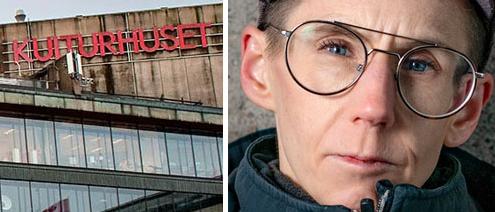Published 2024-04-23 23.28
unsaveSave
expand-left
fullscreen Barakat Ghebrehawariat left the stage after the n-word was used several times during the debate. Photo: Magnus Lejhall/TT
During a debate about racism in the Kulturhuset in Stockholm, the n-word was said several times. That prompted the author and lecturer, Barakat Ghebrehawariat, to leave the room.
Now the moderator Stina Oscarsson defends that the word was used.
– It would have been a completely different matter if the n-word had been directed at Barakat. But the debate was about language and a word, she says.
ⓘ The summary is made with the support of AI tools from OpenAI and quality assured by Aftonbladet. Read our AI policy here.
Show more
chevron-down
Saturday’s debate was supposed to be about racism and the cultural debate – but it all ended with security guards running in and one of the panelists, Barakat Ghebrehawariat, leaving the room.
– Neither the organizer nor the moderator stepped in. In the end, I saw no other way out than to leave, says Barakat Ghebrehawariat.
Criticism of the moderator
In retrospect, the debate has continued. And Ghebrehawariat has directed criticism at the moderator, dramaturg Stina Oscarsson.
– It was not a healthy environment for me, so I left. It is actually the moderator’s responsibility to create a safe environment for me too, he says.
Peter Thörnqvist, whose father was from Sudan, was the audience member who first said the n-word.
– When they debated how to talk to children about such words that are in books, I wanted to describe how I myself had the word thrown at me, but still did not experience the offensiveness of reading to my children in, for example, Astrid Lindgren’s books, he says.
Barakat Ghebrehawariat expressed that he did not want to hear the n-word again. But the word returned.
expand-left
full screenStina Oscarsson was the moderator during the debate. Photo: Staffan Löwstedt/TT
“Creates negative feelings”
– I tried to reason with the other person who said the n-word. I said, “Why is it important for you to say the word? Everyone understands what you mean”. I explained that it makes me sad and creates negative feelings in me, he says and continues:
– I spoke up because no one else spoke up. It’s a racist word and it’s amazing that we still have this debate in 2024, he says.
He calls the conversation “Flashback-like” at times.
Moderator Stina Oscarsson didn’t see it that way. She describes it as an intimate moment with high-level questions from an audience with different backgrounds.
– I assumed that the word wouldn’t come up again when he had said he didn’t want to hear it. But I cannot check in advance what an audience question will contain, she says.
She says Barakat Ghebrehawariat got up and left the second the word was mentioned, even though the man who said it wanted to explain himself.
expand-left
full screen The debate took place in the Kulturhuset in Stockholm. Photo: Marcus Ericsson
“Became irritated”
– Barakat felt that I should have silenced the man and given him a seat instead. Then it degenerated. He became very irritated, loud and demonstratively left the room, says Stina Oscarsson.
But that’s not how Barakat Ghebrehawariat experienced the situation. According to him, Stina Oscarsson conveys an unfair image. She in turn reasons that she did not want to silence the man but let him explain why he used the word.
– It would have been a completely different matter if the n-word had been directed at Barakat, or used to speak disparagingly of another person. But the debate was about language and a word.
But do you understand that he dismissed the call when he had previously asked not to hear the word?
– No, because we were there to discuss the use of that word. And if it is your job to discuss it, you cannot demand to be protected from even hearing the word. The word is not a weapon, she says.
Ola Wong, culture editor at the newspaper Kvartal, was also on the panel. He thinks that you have to see the word from a historical context.
– I was bullied myself and racist slogans were thrown at me at school, shouldn’t I be allowed to use those words? Shouldn’t Peter be allowed to use the word he was bullied with? he says.
